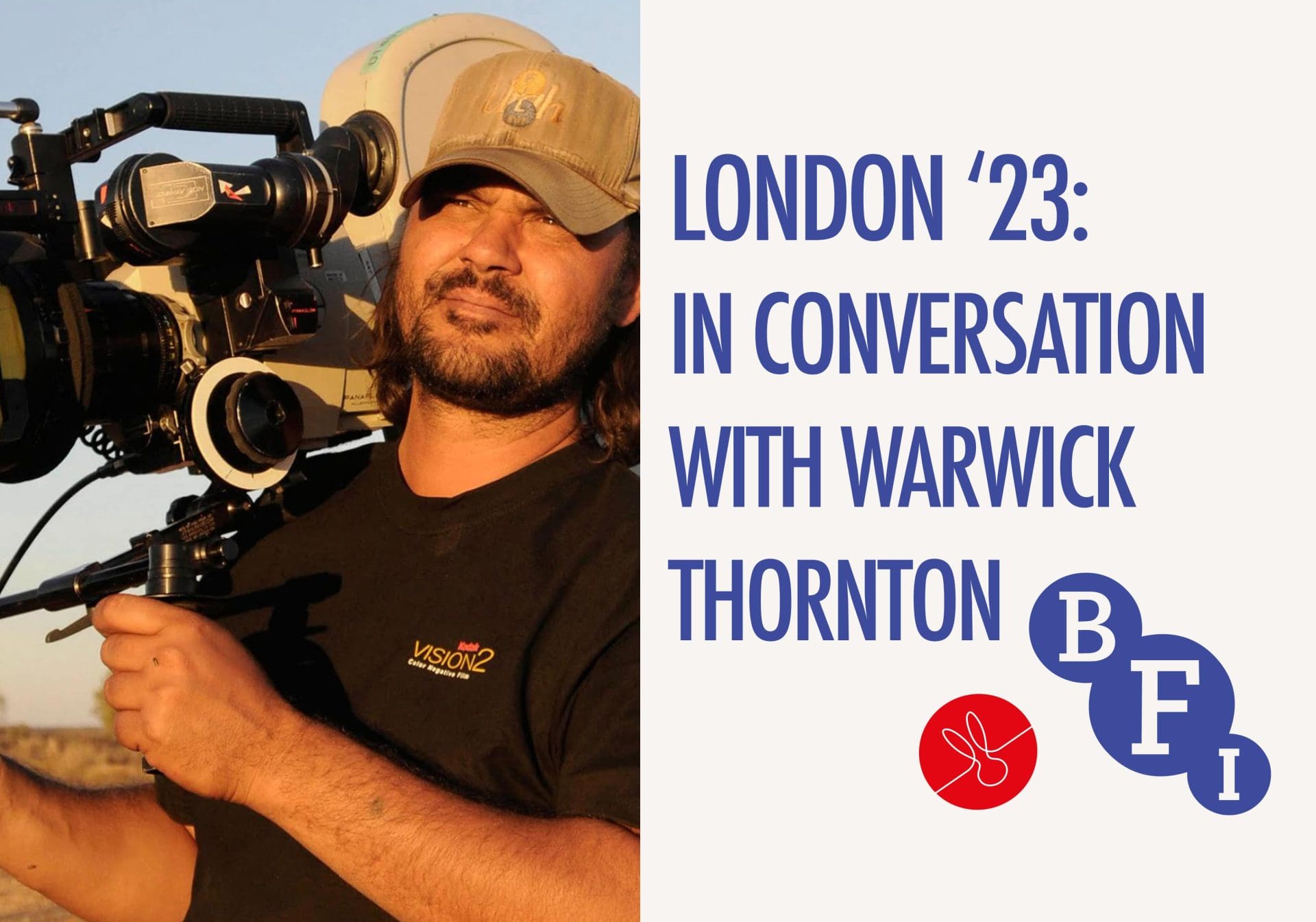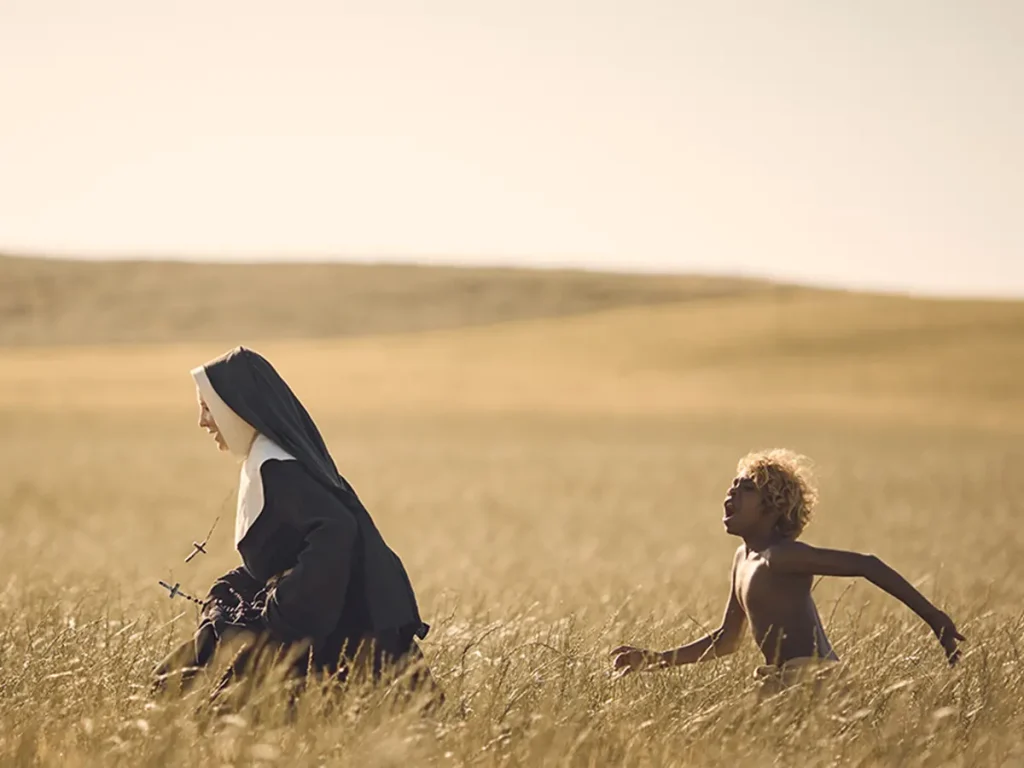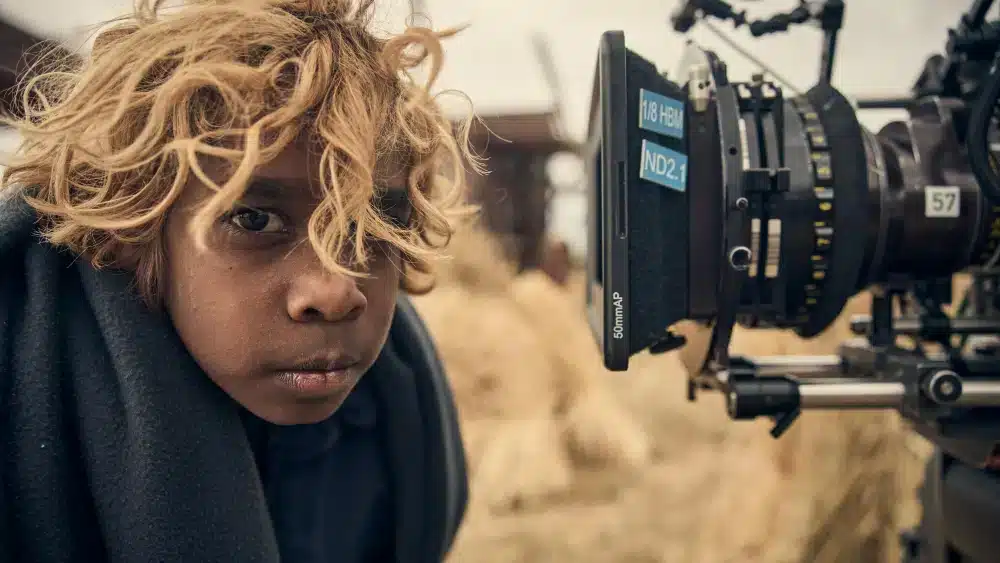
A British October is normally quite typical—heavy rain; a cold-striking breeze, but against all odds this year’s London Film Festival has been blessed with a heatwave. Whether it’s global warming, or just dumb luck, Warwick Thornton has chosen a glistening time to debut his upcoming film The New Boy in the capital. When I meet the Australian director at the Sea Containers hotel he greets me with a calming smile.
The first audience consumption of The New Boy was at its premiere at Cannes Film Festival back in May of this year. Having been at the screening myself, we both acknowledged how Cannes audiences are a different yet thrilling breed, but for Thornton it was a special, hand on heart moment.
From the first frame, you will understand that this film isn’t only quintessentially Australian, but one that is deeply personal, and a guiding light for those who are unaware of the criminally undiscussed culture at its centre. It’s intimate, focussing on an aboriginal boy who gets ushered by police to a Christian monastery. While some may think this is a film attempting to paint religion negatively, it does the opposite. It’s a reflection of both a young boy’s honest struggle and his enduring hope in the face of that struggle. Thornton, an Aboriginal himself, has taken on the journey of telling a story that is loosely based on his own experiences, in collaboration with two-time Oscar winner and fellow Australian Cate Blanchett.
The New Boy is a very unique film, it feels very intimate and personal. The original script was written 18 years ago, how does it feel to finally have it out for audiences to consume after all of these years?
Why it took 18 years was probably because it was badly written. You know, the reality of it was that it was not perfect and amazing. Back then, I actually needed to live, love and cry and do all the human things to actually become a better filmmaker. I think if I made it 18 years ago it would have been really bad. So yeah, it’s just a sigh of relief, I guess. And, it worked. Thankfully. You have those scripts and it’s like flogging a dead horse. They shouldn’t be made. 18 years, that’s ridiculous. But you know, you stick to your guns and then suddenly it does work. It’s quite empowering.
Cate Blanchett not only stars in and produces the film but she also helped to re-adjust the script. What was the collaboration process like for you?
You need some of Cate’s power, as well as her husband Andrew Upton. He’s incredible with scripts, he actually helped a lot with finding the missed opportunities
[within the story]. I couldn’t see the trees from the forest, or the forest from the trees, or whatever it is. And just going ‘how is this going to work’. The power of Cate is that you kind of become a yes director – ‘okay, let’s do that’. Then you have to stop and you go ‘slow down Warwick, it’s a good idea but is it the right idea for the film’. You have to be careful too because it’s called The New Boy and she plays a character called Sister Eileen the nun and she’s very, very thoughtful. I’ve worked with a lot of actors, all creatures great and small that just fight for their presence in a film where they will try and make you rewrite their character to make their character the main character. Cate is one of those beautiful, soulful thinkers and is an artist who knew the place of the character. It is called The New Boy and tries not to overtake and take control of the characters presence in the film. She made sure that she kept the character’s ground surrounding the main character which is The New Boy, which was really special.
Writing can be very therapeutic and though the film is not entirely autobiographical, did you feel some sort of release once you had finalised the script?
Yeah, you have this sort of jubilation of ‘oh my god, i just wrote that and it’s just come from your brain’. There’s something really empowering about writing and I’m dyslexic and slightly illiterate. I write everything in freehand, I don’t own a computer. I’ve got an Ipad but I can’t tie that to flow, my brainwaves work way too fast. So when I write I go down to my local news agency and buy a couple of A4 blank books and then I just start writing with pen and paper. It’s such a beautiful moment in your life when you complete a script, whether it’s good or bad. Just completing it and having the art there. You might have a lot of missed opportunities where you’ve overwritten it and all of that stuff. Then you have to hand it over to someone with fresh eyes and ears to look at it and help you with your missed opportunities or tell you that you’ve over-explained a lot and maybe [I] need to be a bit more cryptic. Rather than just explaining everything to them [the audience], a bit of the script out so they need to have an opinion and be able to work with you when they watch the movie. So, you need all that kind of stuff, but it’s really empowering. It’s really special to actually finish a script.
With a script like The New Boy, there was a priest rather than Sister Eileen. The time and having separation from the script for a quite a long time and Cate coming along when she rocked up and we started talking during COVID when we were stuck in our castles and weren’t allowed out. [We talked about] what are we going to do? Let’s do something because we’ve never worked together. I used to say that I’ve never actually met her, but I had met her. I just completely forgot. How do you forget that you’ve met Cate? Like c’mon Warwick, you’re a bit of a village idiot if you’ve forgotten that you’ve met Cate Blanchett. It was actually here in London when Sweet Country was here for the festival a couple of years ago. The universe provides beautiful things in that way, the scope is there and then suddenly you meet the right person. Then suddenly you do a gender swap of the character from male to female, but keeping the same driving arc. Beautiful things happen.

Cate appears to be someone who is very much an advocate for cinema, which helps because this is a type of film that cinema needs. One where an audience can learn something about struggle but still having a positive note at the end.
Yeah absolutely. The film [originally] was about a priest, if you’ve seen the poster it used to be called Father and Son. That film would have been some kind of ugly vanity credit film by Warwick Thornton at the bottom. That film I probably wouldn’t even go and watch it because you’d instantly think about paedophilia. And it’s not like that, it’s actually like that, and it was important for the film to be balanced. Sister Eileen is not a nasty human being. She’s the danger of her naivety and The New Boy is not nasty, he’s just trying to survive this world. It was about trying to keep that balance and not trying to push you know, ‘Christianity killed us’. We’re not trying to create a line in the sand about what’s good and bad, or what’s black and white but everyone’s in it together.
Aswan Reid is a standout in the film. How quickly from meeting him did you realise you had found your protagonist?
We did a call out across Australia for casting The New Boy and he was the second child I had seen on my phone where people were just sending me videos. It was the back of his head and I was going ‘who is this kid?’. From the tape he was just starting to walk down, bare foot, no shirt, walking down a dirt road in the middle of the desert outside of an aboriginal community. This kid had this instant aura and it was just from the back of his head. We finally see the front of him and it’s like ‘he’s perfect’. Then you have to go through a whole torture with the casting director and reminds you that you have to go and look at another 100 kids for some reason. It was pretty instant.
There’s a lot of references to snakes and from my research they are quite symbolic in Australia with a meaning of strength, creativity and continuity. How important was it for you to balance the themes of hope and struggle within the film?
The snakes are an interesting one because in organised religion like Christianity that the snake was the one who sold the apple to Eve so that she ate the apple and then she got knowledge and wrecked the world. In Australia there’s 400 different languages, and 400 different types of spiritual connections. A lot of them are to do with the Rainbow Serpent which is a traditional rainbow you see in the sky or a giant snake the creator of the sky. It’s about trying to keep that same symbiotic sort of symbolism happening between two religions. There’s a good version of the snake and then there’s a bad version of the snake that’s slightly poisonous but we believe that the poison is not necessarily a bad thing. There’s all of this sort of cross pollination of the image of the snake in the film.

I love how the score was similar throughout but also intertwined with natural sounds such as birds and the wind. What was it like to work with Nick Cave and Warren Ellis?
They’re old friends. We’ve never actually worked together, but we’ve sort of hung out a fair bit. Most of my films don’t have music in them. They’re totally diegetic and the only music comes from sources whether it’s the radio in a car, or a pub at the end of the street. This time when thinking about the film I thought we needed a little bit here and there. We’ll keep it really sparse like give it more of a seventies kind of Italian cinema where it’s quite sparse. Not very much music but a key score for the emotional turning points. Then we cut the film and it was screaming at me going ‘I want a big score’. I want a wall for wall, emotional connection through rhythms and melodies. Nick and Warren were already on board. They were in London and I did the wrong thing that I always do, I put in temp music and then you fall in love with the temp music. Then your asking Nick Cave and Warren Ellis to sort of emulate someone else’s stuff was pretty bouncing, but they took it on. I don’t know if they thought that they were just going to reassemble a jug band originally and then suddenly it turned into six cellos and eight violins, the kettle drums. They had the full orchestra. Warren always said to me that they were throwing really out of their comfort zone but absolutely loved it. They were really empowered by it because I don’t think they’ve done anything like this big kind of score before. They were really proud. I’ve talked to Warren a couple of times about releasing [the score] on vinyl as a soundtrack. That would be an incredible achievement.
Compared to normal music on vinyl, it’s absolutely different. The sound and energy…
Absolutely! There’s enough there and I think for me It would be a great score to write to, [something] you can put on in the background whilst writing. It would be really special. They took this film which was incredible already with Cate Blanchett and they raised the bar with the music. It empowered the child, empowered the characters and created a beautiful atmosphere. I don’t know if I could have done it without them.
Now the film has premiered at Cannes and now London, upon its release soon what do you want audiences to take away from the film?
I’m aboriginal, so I have a lot to say. I try to make films that give voices to the voiceless, to who are my people. That foremost for me is also entertainment. I have the foundations of entertainment in the movies that I make. I’m [also] into the foundation of educating an audience about a place and a space in the universe that they have probably never had access to, so that’s important to me. Opening the door and giving people a story they might ever be able to go to or might never actually think about, showing audiences the universe that you can escape into, it can educate you if you want. It’s also two hours where you can run away from your existence.





